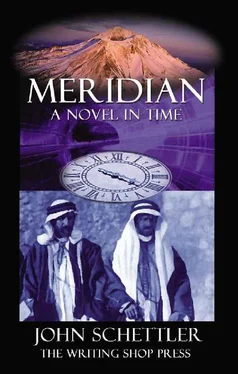“You sure about this, Robert?” He didn’t want to believe that they could miss their target date so badly.
“Look around, Paul. Kelly screwed the whole thing up, can’t you see that?”
The more he stared at the ominous sky, the more Paul came to realize the truth. They were lost—buried in time. They had gone so far back that humans had not even evolved. The thought staggered him for a moment, and his face betrayed a curious mixture of awe and fear.
“Now, how the hell will we get back, would you please tell me that?” Nordhausen had already transitioned from denial to anger, and he voiced the one obvious concern that he hoped Paul could quickly amend.
“Don’t worry,” Paul was wide eyed as he looked at the terrain with new apprehension. “We won’t be here long.”
“What do you mean?” Nordhausen latched on to the statement.
“The machine is set to pull us out,” Paul explained. “Besides, Kelly is standing the watch on the shift. He’ll see what’s happened.”
“Kelly? He’s the one that got us into this fix!” Nordhausen took no solace from Paul’s argument. “It’s a miracle he didn’t have us materialize inside solid rock, or somewhere up in that , so we could just plunge to our doom.” He gestured at the smoldering sky.
“That can’t happen, “ Paul explained. “The pattern buffers prevent that sort of thing. The shift accounts for differences in the landforms over time, and moves us appropriately based on the reference point of the mass and gravity—” He stopped his explanation, seeing how Nordhausen’s face dropped as he started in on the physics. “Humans are never found alive while embedded in solid rock, or hovering a thousand feet above the atmosphere. The machine accounts for these things. Just take my word for it, OK?”
“Well this wasn’t supposed to happen either, was it?” Nordhausen would not be put off so easily.”
“Look, we missed our breaching point, that’s all.”
“Missed it? You make it sound as if we just missed a damn BART train! We landed in the middle of the fucking Cretaceous, Paul—Do you realize that?”
“Well what do you expect me to do about it?” Paul warmed to the argument a bit.
“Get us out of here, that’s what!”
“Calm down, Robert. Kelly’s will take care of us. He must have entered a bad variable.”
“No shit!”
“And he’ll find out what’s happened and take the appropriate action. Besides, the fail-safe will pull us out in time. Remember? We don’t belong here, and Time will see us safely home again.”
“Well I wish I could be so certain.” Nordhausen was still frustrated, but he slowly composed himself, accepting his fate.
Paul fingered the thin film of reddish-white substance on the rocks. “I’ll bet there’s iridium in this stuff.”
“Iridium?”
“Yes, it’s a common byproduct that fits with the major impact theory.”
“There you go with that asteroid business again. You’re not going to just sit here and talk disaster theory, are you?”
“Well why not? You put the clues together a moment ago. If we are where you think we are, then we’ve got a unique look at what may have happened during the last extinction event. No sense moping about it. Let’s do some science while we’re waiting for the retraction. All those clues were consistent with a major impact, right?”
“I suppose your going to feed me that nonsense about some mysterious dark star.”
“It’s not my theory,” Paul protested. “Alvarez and a few of his colleagues came up with the idea at U.C. Berkeley. They found all this stuff was prevalent on the K-T boundary: iridium, shocked quartz, tektites, little glass beads, and it was followed by a fern spike when most of the other pollen breeding plants died out. It’s happened before, you know.”
“Only too well,” there was a complaint in Nordhausen’s tone. “Mass extinctions seem to occur on earth every 26 million years, so they came up with the idea that a small dark star called Nemesis was disturbing debris in the Oort cloud outside the solar system, and sending a rain of asteroids and comets down on us. Yes, Paul, I’ve heard that rubbish.”
“Hell, Robert, look around! I’ll bet we’ve landed smack dab in the middle of the last major extinction event! We’re probably right on the K-T boundary, perhaps only a few years after the asteroid hit.”
The Alvarez theory had been debated for some time in the scientific community after the discovery of a thin layer of sediments in old rock formations dating back to the Cretaceous period. Iridium had been found there in concentrations well above the norm. It was a relatively rare element on earth, usually deep under the surface, but was thought to be present in asteroids that would strike the planet at regular intervals. The other clues all supported this possibility as well. Tektites and shocked quartz were also byproducts of a massive collision where the ejecta would have been thrown up into the atmosphere, falling hundreds, even thousands of miles away. The resulting obscuration was made worse as raging fires added smoke and cinder to the mix. Sunlight struggled to reach the surface, and temperatures dropped very suddenly—not a good thing for cold blooded creatures like the Dinosaurs. Mass extinction followed as hundreds of thousands of species were wiped out. It had happened before, five times, throughout the earth’s long history. The K-T event, as it was called, ushered in the new era of the Tertiary period, where humans arrived very late in the process of evolution.
“The K-T boundary. Yes, that makes good sense.” Nordhausen was finally starting to get his mind around the situation. “Looks like we’ve jumped out of the frying pan and landed in the fire. We were happily watching the sixth major extinction event, and now we get to take a peek at the fifth.”
“Sixth extinction?”
“Of course! We’re losing some 30,000 species or more per year in our time. That’s equivalent to the same die-off rate of this time period, the last great extinction that wiped out the dinos. Everyone focuses on them, God rest their souls, though the extinction in the marine life was much more severe. Maybe it was a comet or asteroid, though I’m inclined to side with the gradualists. Probably a combination of many things: climate change, competition from egg-eating mammals, volcanic activity, disease. They all played a part in the K-T event, and the asteroid was probably just the icing on the cake. It was one of your imperatives, Paul. They used to call them ‘Acts of God’ before you dreamt up your time theory, and what God wants, God gets. No more dinos.”
“Strange,” said Paul. “Is it really that bad—back home I mean?”
“What, the extinction? Certainly! Normal background loss for species is only about four or five per year. But we’ve been hard at work, day in and day out, doing the job of the next asteroid. Human civilization has had such a terrible impact on the planet that, by the time the next big hunk of rock arrives, the sixth extinction will probably have run its course. The asteroid will just be the icing on our cake, and the end of everything.”
“You mean we’re causing the sixth extinction?”
“Who else? We’ve been at it for thousands of years: invading and destroying habitats, cultivating one species in favor of another, introducing alien germs and creatures in unfamiliar environments, not to mention the pollution we cause. Hell, we’ve bred all the diversity out of wheat so we can have our toast in the morning. Now that plant is totally dependent on human cultivation to survive. That’s just one tiny example—I could go on for hours. If you ask me, we’ve been up to a great deal of mischief, just futzing about trying to amuse ourselves. Unfortunately the planet has been paying the price. The dinos are long gone and perhaps we’re next in line if things keep on. These Holy Fighters who blew up Palma are hastening the process, but the rest of us are just as guilty. Talk about fiddling while Rome burns! We spend all our energy selling trinkets and trifles to keep the masses fat and happy, while the planet is dying right beneath our feet.”
Читать дальше












